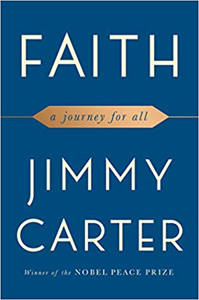 Jimmy Carter, Faith: A Journey for All (New York: Simon and Schuster, 2018), 179pp.
Jimmy Carter, Faith: A Journey for All (New York: Simon and Schuster, 2018), 179pp.
Jimmy Carter might not have been one of our country's greatest presidents, but since his four years in office (1977–1981), and a bitter defeat for re-election at the age of fifty-six, the 39th president has lived a full and purposeful life. In 1982 he founded the Carter Center to combat the global scourges of war, poverty, and disease. In 2002 he won the Nobel Peace Prize. For the last thirty-five years, he and his wife Rosalynn have spent at least one week a year building houses for the poor. And this little volume on faith is his thirtieth book.
Faith expressing itself in love, says the apostle Paul, is "the only thing that matters" (Galatians 5:6). He never really articulates the distinction, and like many people he switches back and forth between the two, but for Carter faith is both a verb (to believe or trust), and also a noun (that which is believed). He notes, for example, that one of the earliest faiths that anyone has is their implicit trust in their mother's love. We all have faith in basic principles, some "central core" that is enduring and never changes, a sort of "permanent foundation on which our lives can be fashioned," or "something unshakeable in which to have faith" — like the Universal Declaration of Human Rights, the Bill of Rights, the Ten Commandments, or the Sermon on the Mount.
Carter draws heavily (and rather nostalgically) on his own personal experiences of Christian faith and political service, including his many decades of teaching Sunday School in his Georgia Baptist Church. There's a chapter on eight people who have inspired his faith, which includes Millard Fuller (the founder of Habitat for Humanity), his mother Lillian who joined the Peace Corps at the age of sixty-eight, and even his brother Billy who conquered his alcoholism.
Carter can sound sanctimonious. Garry Wills, for example, has noted his "prissy nagging." But it's worth remembering that back in his own day, the people who really disliked Carter were his own Southern Baptists and the newly founded Moral Majority (1979) that voted him out of office for cancelling Bob Jones University’s tax exemption, supporting the Equal Rights Amendment, calling for a Palestinian homeland, and holding a family conference where abortion, contraception, gay rights, and divorce were part of the discussion.
Much to his credit, Carter is deeply disturbed about a number of issues. On the second page of the book he uses italics to remind us that the nuclear threat still exists. In an op-ed ten days before the US invasion ("Just War — Or a Just War?"), he opposed the war with what is now a fulfilled prophecy: “Although there are visions of peace and democracy in Iraq, it is quite possible that the aftermath of a military invasion will destabilize the region and prompt terrorists to further jeopardize our security at home.” He laments that in 2017 “there were 240,000 American troops openly stationed in at least 172 foreign countries, plus more than 37,000 others in places militarily classified as secret,” while the American “infrastructure investment gap” (p. 136) is the largest of the 50 richest nations. He similarly objects to our country's highest incarceration rates in the world, and our environmental degradation.
Yes, this is a simple book by a man who in some ways has a simple faith. Fair enough. But like Wills, I too am encouraged that Carter "keeps on teaching his Bible classes in his 93rd year. He is still looking in the Bible for the mercy and love of God, and he helps me find them there."


